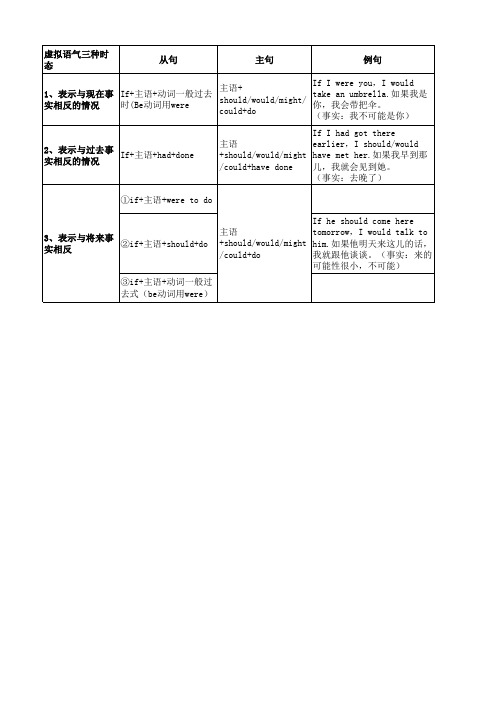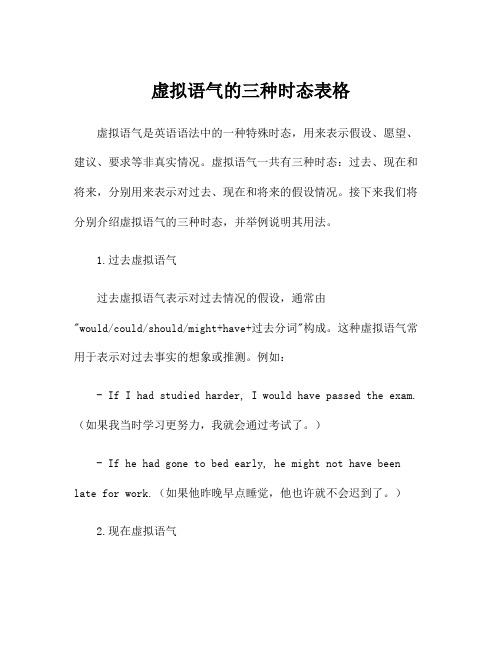虚拟语气详解及时态
虚拟语气的三种时态表格

虚拟语气的三种时态表格虚拟语气是一种用来表示虚构、假设或未实现的情况的语法结构。
在英语中,虚拟语气通常由虚拟动词(如“would”、“could”、“should”等)+动词原形构成,并且常常与if条件句搭配使用。
虚拟语气可以表示对过去、现在和将来的假设,因此有三种时态:过去虚拟语气、现在虚拟语气和将来虚拟语气。
下面将分别介绍这三种时态的用法和构成。
一、过去虚拟语气1.用法:过去虚拟语气用于表示对过去的假设、愿望和建议。
常常与与过去事实相反的条件句连用,如“If I were you, I would have studied harder”。
2.构成:过去虚拟语气的构成通常为:虚拟助动词(如“would”,“could”或“should”等)+动词原形。
3.示例:如果我当时有更多的时间,我就会帮你的。
If I had had more time, I would have helped you.4.注意:过去虚拟语气中,动词“be”的过去虚拟形式通常是“were”,无论主语是第一人称单数、复数、第二人称还是第三人称。
如果我是你,我就会去。
If I were you, I would go.二、现在虚拟语气1.用法:现在虚拟语气用于表示对现在的假设、愿望和建议,常常与虚拟条件引导词“wish”,“if only”和“it's time”连用。
2.构成:现在虚拟语气的构成通常为:虚拟助动词(如“would”,“could”或“should”等)+动词原形。
3.示例:但愿我现在能够说流利的英语。
I wish I could speak fluent English now.4.注意:在现在虚拟语气中,常使用过去时来表示对现在的虚拟语气,因此要注意虚拟助动词和动词原形的搭配。
如果有更多的钱,我就能够去旅行。
If I had more money, I could travel.三、将来虚拟语气1.用法:将来虚拟语气用于表示对将来的假设、愿望和建议,通常与would like to,had better等一起使用。
虚拟语气详解及时态

二、虚拟语气(Subjunctive Mood)1. 主语从句中的虚拟语气主语从句(常用形式主语it 来代替,结构为It is that…)中的虚拟语气主要取决于某些用来表示建议、命令、要求、惊异和失望等的形容词和过去分词,其形式为:(should)+ 动词原形。
常这样用的形容词有:appropriate,advisable,better,desirable,essential,imperative,important,insistent,natural,necessary,preferable,strange,urgent,vital等。
过去分词有:desired, demanded, ordered, requested, suggested, recommended, required 等。
例如:It is essential that you (should) win the voters’ hearts.It was suggested that he (should) join the club activities.2. 表语从句和同位语从句中的虚拟语气在表示建议、命令、主张、目的和愿望等的名词后面的表语从句和同位语从句中谓语动词要求使用虚拟语气。
其形式为:(should)+ 动词原形。
常这样用的名词有:resolution, pray, decision, motion, suggestion, preference, proposal, advice, recommendation, desire, demand, requirement, order, necessity, request, idea 等。
例如:He gave orders that the guests (should) be hospitably entertained. 他下令热情款待这些客人。
His proposal is that we (should) get rid of the bad habits.3. 宾语从句中的虚拟语气1)某些动词后所接宾语从句中的谓语动词要求用虚拟语气,用来表示建议、命令和要求等。
虚拟语气的三种时态表格

虚拟语气的三种时态表格虚拟语气是用来表示假设、愿望、建议和命令的一种语气。
在英语中,虚拟语气主要通过谓语动词的形式来表示,通常使用动词的过去式、助动词could/should/would/ might/had+过去分词来构成。
虚拟语气分为三种时态:过去时、现在时和将来时。
下面将分别介绍这三种时态的用法及例句。
一、过去时1.用法过去时的虚拟语气表示与现实相反的假设或愿望,常用于条件句和表达愿望的句子中。
2.例句If I were you, I would have told her the truth.(如果我是你,我会告诉她实情。
)I wish I had studied harder when I was in college.(我希望我上大学时更努力学习。
)二、现在时1.用法现在时的虚拟语气表示与现实相反的假设,常用于条件句和表达愿望的句子中。
2.例句If he were rich, he could travel around the world.(如果他富有,他就可以环游世界。
)I wish she were here with us now.(但愿她现在和我们在一起。
)三、将来时1.用法将来时的虚拟语气表示与现实相反的假设或愿望,常用于条件句和表达愿望的句子中。
2.例句If I should win the lottery, I would buy a big house.(如果我中彩了,我会买一栋大房子。
)I wish you would come to the party tomorrow.(但愿你明天能来参加聚会。
)虚拟语气在英语中具有重要的用法和表达方式,正确的掌握虚拟语气的时态及使用方法,可以使我们的表达更加丰富和灵活。
在实际应用中,我们需要根据具体的语境和情景来选择合适的虚拟语气时态,以确保我们的表达准确清晰。
在现实生活中,我们经常会遇到需要用到虚拟语气的情况,比如在表达假设、愿望、建议和命令时。
英语虚拟语气三种时态

+should/would/might have met her.如果我早到那
/c会见到她。
(事实:去晚了)
①if+主语+were to do
3、表示与将来事 实相反
②if+主语+should+do
If he should come here
主语
tomorrow,I would talk to
主语+ should/would/might/ could+do
If I were you,I would take an umbrella.如果我是 你,我会带把伞。 (事实:我不可能是你)
2、表示与过去事 实相反的情况
If+主语+had+done
If I had got there
主语
earlier,I should/would
虚拟语气三种时态从句主句例句1表示与现在事实相反的情况if主语动词一般过去时be动词用were主语shouldwouldmightcoulddoifiwereyouiwouldtakeanumbrella
虚拟语气三种时 态
从句
主句
例句
1、表示与现在事 实相反的情况
If+主语+动词一般过去 时(Be动词用were
+should/would/might him.如果他明天来这儿的话,
/could+do
我就跟他谈谈。(事实:来的
可能性很小,不可能)
③if+主语+动词一般过 去式(be动词用were)
虚拟语气的三种时态表格

虚拟语气的三种时态表格虚拟语气是表达虚拟条件、虚拟愿望、虚拟假设等意义的语气。
在英语中,虚拟语气主要有三种时态形式,包括过去时的虚拟语气、过去完成时的虚拟语气和将来时的虚拟语气。
虚拟语气的使用对语言的表达能力起着重要的作用,能够使语言更为丰富和精确。
本文将就虚拟语气的三种时态形式进行详细的讲解,希望能给读者带来一定的帮助。
一、过去时的虚拟语气1.过去时的虚拟语气用于表示与现在事实相反的假设和虚拟条件。
例如:If I were a bird, I would fly high in the sky.(如果我是一只鸟,我就能飞到天空中)。
2.虚拟条件从句中动词be用were代替was,其他动词形式保持不变。
例如:If I were you, I would not do that.(如果我是你,我就不会那样做)。
3.过去时的虚拟语气还可用于表达对现在的愿望。
例如:I wishI were a millionaire.(我希望我是个百万富翁)。
4.过去时的虚拟语气还可用于表达对过去事实的否定。
例如:If she had tried harder, she would have passed the exam.(如果她努力一点,她就能通过考试)。
二、过去完成时的虚拟语气1.过去完成时的虚拟语气用于表示对过去情况的假设和虚拟条件。
例如:If I had known it, I would have helped you.(如果我知道了,我就会帮助你)。
2.过去完成时的虚拟语气常与if引导的条件从句连用,表示过去的假设情况。
例如:If you had asked me, I would have told you.(如果你问我,我就告诉你)。
3.过去完成时的虚拟语气还可用于表达对过去情况的遗憾或后悔。
例如:I wish I had studied harder when I was in school.(我希望我在学校时更努力地学习)。
虚拟语气的三种时态表格

虚拟语气的三种时态表格虚拟语气是英语语法中的一种特殊时态,用来表示假设、愿望、建议、要求等非真实情况。
虚拟语气一共有三种时态:过去、现在和将来,分别用来表示对过去、现在和将来的假设情况。
接下来我们将分别介绍虚拟语气的三种时态,并举例说明其用法。
1.过去虚拟语气过去虚拟语气表示对过去情况的假设,通常由"would/could/should/might+have+过去分词"构成。
这种虚拟语气常用于表示对过去事实的想象或推测。
例如:- If I had studied harder, I would have passed the exam.(如果我当时学习更努力,我就会通过考试了。
)- If he had gone to bed early, he might not have been late for work.(如果他昨晚早点睡觉,他也许就不会迟到了。
)2.现在虚拟语气现在虚拟语气表示对现在情况的假设,通常由"would/could/should/might+动词原形"构成。
这种虚拟语气常用于表示对现在事实的假设或建议。
例如:- If I were you, I would take the job offer.(如果我是你,我会接受这份工作。
)- If she had more time, she could finish the project by herself.(如果她有更多时间,她可以自己完成这个项目。
)3.将来虚拟语气将来虚拟语气表示对将来情况的假设,通常由"would/could/should/might+动词原形"构成。
这种虚拟语气常用于表示对将来事实的假设或期望。
例如:- If it were to rain tomorrow, we would have to cancelthe picnic.(如果明天下雨的话,我们就得取消野餐了。
高中必备知识点解析虚拟语气的形式与用法

高中必备知识点解析虚拟语气的形式与用法虚拟语气是高中英语必备的语法知识点之一。
它在英语中经常被用于表达假设、愿望、建议、命令和推测等情态,通过使用虚拟语气,可以使语言更加丰富和准确。
本文将深入解析虚拟语气的形式与用法。
一、虚拟语气的形式1. 虚拟语气的一般现在时:用于表示与现在事实相反的情况。
其结构为:主语+动词原形(倒装)。
例如:If I were you, I would study harder.(如果我是你,我会更加努力学习。
)2. 虚拟语气的一般过去时:用于表示与过去事实相反的情况。
其结构为:主语+动词过去式(倒装)。
例如:If I had seen her yesterday, I would have said hello.(如果我昨天见到她,我会问好的。
)3. 虚拟语气的过去完成时:用于表示对过去情况的猜测或不可能发生的情况。
其结构为:主语+动词过去完成式(倒装)。
例如:I wish I had studied harder for the exam.(我希望我为考试努力学习。
)二、虚拟语气的用法1. 表达假设与条件:If I were you, I would travel around the world.(如果我是你,我会环游世界。
)I wish I had a million dollars.(我希望我有一百万美元。
)2. 表达愿望与建议:I wish you would stop smoking.(我希望你戒烟。
)It's important that she arrive on time.(她按时到达很重要。
)3. 表达命令与要求:The teacher ordered that the students be quiet.(老师要求学生们保持安静。
)She insisted that he leave immediately.(她坚持要他立刻离开。
)4. 表达推测与猜测:He looks as if he were sick.(他看起来像是生病了。
英语虚拟语气的基本用法归纳【建议7篇】

英语虚拟语气的基本用法归纳【优秀7篇】
编者按:虚拟语气为了体现与陈述、疑问、祈使语气的不同,使用两种形式来标志区别,即用与平时的谓语时态、动词形式不相同的形式表现出来,其时态形式一般要往过去时间对应地移一步。
下面是我辛苦为朋友们带来的7篇《英语虚拟语气的基本用法归纳》,如果能帮助到您,小编将不胜荣幸。
if引导条件状语从句的用法篇二
虚拟语气的时态篇七
一、过去式:
if 从句:had done
英语语法:虚拟语气的时态
主句:情态动词(would,could,might,should)+have done
英语语法:虚拟语气的时态
二、现在式:
if 从句:did/were
英语语法:虚拟语气的时态
主句:情态动词(would,could,might,should)+do
英语语法:虚拟语气的时态
三、将来时:
if 从句:①should/shall do
②were to do
③did/were
英语语法:虚拟语气的时态
6
主句:情态动词(would,could,might,should)+do
以上就是小编为大家带来的7篇《英语虚拟语气的基本用法归纳》,希望可以启发您的一些写作思路。
- 1、下载文档前请自行甄别文档内容的完整性,平台不提供额外的编辑、内容补充、找答案等附加服务。
- 2、"仅部分预览"的文档,不可在线预览部分如存在完整性等问题,可反馈申请退款(可完整预览的文档不适用该条件!)。
- 3、如文档侵犯您的权益,请联系客服反馈,我们会尽快为您处理(人工客服工作时间:9:00-18:30)。
二、虚拟语气(Subjunctive Mood)1. 主语从句中的虚拟语气主语从句(常用形式主语it 来代替,结构为It is that…)中的虚拟语气主要取决于某些用来表示建议、命令、要求、惊异和失望等的形容词和过去分词,其形式为:(should)+ 动词原形。
常这样用的形容词有:appropriate,advisable,better,desirable,essential,imperative,important,insistent,natural,necessary,preferable,strange,urgent,vital等。
过去分词有:desired, demanded, ordered, requested, suggested, recommended, required 等。
例如:It is essential that you (should) win the voters’ hearts.It was suggested that he (should) join the club activities.2. 表语从句和同位语从句中的虚拟语气在表示建议、命令、主张、目的和愿望等的名词后面的表语从句和同位语从句中谓语动词要求使用虚拟语气。
其形式为:(should)+ 动词原形。
常这样用的名词有:resolution, pray, decision, motion, suggestion, preference, proposal, advice, recommendation, desire, demand, requirement, order, necessity, request, idea 等。
例如:He gave orders that the guests (should) be hospitably entertained. 他下令热情款待这些客人。
His proposal is that we (should) get rid of the bad habits.3. 宾语从句中的虚拟语气1)某些动词后所接宾语从句中的谓语动词要求用虚拟语气,用来表示建议、命令和要求等。
其形式为:(should)+ 动词原形。
常这样用的动词有:ask (要求), advise, determine, decide, command, insist, intend, move, prefer, propose, order, recommend, request, require, suggest, urge, demand, desire, direct等。
例如:He insisted that the meeting (should) be put off. 他要求推迟那个会议。
They proposed that all the plans (should) be discussed at the meeting. 他们建议所有的计划都应该在会上讨论。
2)在以it为形式宾语的复合宾语从句中也可以用虚拟语气,其形式为:(should)+ 动词原形。
这一句型中使用的形容词(宾补)和主语从句中的虚拟语气所使用的形容词相同。
例如:We think it advisable that he (should) think deeply before acting. 我们认为他在行动之前好好考虑一下才是明智的。
3)wish后面所跟的宾语从句中的虚拟语气表示某种不能实现的愿望。
表示对现在情况的虚拟wish + 主语+ 动词过去式(be用were)表示对过去情况的虚拟wish + 主语+ had + 过去分词表示对将来情况的虚拟wish + 主语+ would + 动词原形例如:I wish I knew what was going to happen. 但愿我能知道要发生什么事。
She wished she had stayed at home. 她后悔当时不在家。
I wish I were rich. 我巴不得我很有钱。
注意:在表示对过去情况的虚拟时,有时也可以用下列形式:wish + 主语+ would(could)+ have + 过去分词I wish I could have seen her last night. 要是我昨天晚上能够见到她那该多好。
4. if条件句中的虚拟语气形式1)if 非真实条件句所表示的假设则是不可能或不大可能发生或实现的,句中的主句和从句都用虚拟语气。
从句主句和现在事实相反动词过去式(be 用were)would(should,could,might)+ 动词原形和过去事实相反had + 过去分词should(would,could, might)+ have + 过去分词和将来事实可能相反动词过去式(should+动词原形,were to + 动词原形)should(would,could,might)+ 动词原形例如:If there were no gravity, we should not be able to walk. 假如没有引力,我们就不可能行走。
I wo uldn’t have known what these were for if I hadn’t been told. 假如别人不告诉我,我就不知道这些东西是干什么的了。
2)正式文体中,有时可把虚拟条件句中的连词if省去,而将were, had, should 等助动词(不包括行为动词)提到主语前面倒装处理。
如果句中没有were, had 或should 时,既不能省略if,也不能倒装。
例如:Were I to meet him tomorrow (= If I were to meet him tomorrow), I should ask him about it. 要是我明天见到他,我就会问他这件事的。
Had I had the money last year (= If I had had the money last year), I would have bought the house. 如果我去年有了这笔钱,我就买那所房子了。
3)时间错综条件句:通常情况下,在非真实条件句中主句和从句的谓语动词所指时间是一致的,但有时也可能指不同的时间,这时要根据上下文的意思采用不同的谓语动词形式。
例如:If I were you, I would have taken his advice. 我要是你,就采纳他的建议了。
(从句指现在,主句指过去)If the weather had been more favorable, the crop would be growing still better. 如果气候更适宜一些,庄稼会长得更好。
(从句指过去,主句指现在)5. 含蓄虚拟条件句1)有时假设的情况并不以条件从句形式表示出来,而是通过一个介词短语或其他方式表示。
常用的词或短语有:without, but for, but that, otherwise, or, but 等。
例如:Without your help (=If we had not had your help), we could not have succeeded. 要是没有你的帮助,我们是不会成功的。
But for electricity (= If there were no electricity), there would be no modern industry. 要是没有电,就不会有现代工业。
He was having a meeting; otherwise he would have come over to help us. 他当时正在开会,否则的话他就来帮我们了。
He felt very tired yesterday, or he would have attended the party. 他昨天很累,不然他就参加那个聚会了。
2)在某些暗含虚拟条件的简单句中,虚拟语气可通过上下文表现出来。
谓语动词用should/would be 形式和should/would have been 虚拟形式。
例如:Any men in his position would have done like that. 任何人处在他的位置都会那么做的。
You should (ought to) have come earlier. 你本应早点来的。
6. 其他句型中的虚拟语气1)在would rather, would sooner, would just as soon, might as well 和would prefer 等后面所跟的从句中,也要用虚拟语气,表示愿望,意为“宁愿、但愿”。
其形式为:①“would rather (would sooner…) + 主语+ 谓语动词过去式” 表示现在或将来的情况。
②“would rather (would sooner…) + 主语+ 动词过去完成式”表示过去的情况。
例如:I’d rather he didn’t go now. 要是他现在不走就好了。
I’d just as soon you had been here yesterday. 要是你昨天在这里就好了。
2)在句型“It is (high/ about) time…” 后面也可以跟虚拟语气,从句中常用过去式。
有时也用“(should) + 动词原形”,意为“该是……的时候了”。
例如:It is time that the boy (should) go to school. 这个小孩该上学了。
It is high time (that) the weather improved. 天气真该好起来了。
3)在“if only” 引起的感叹句中也要求用虚拟语气,表示愿望。
形式为:①用过去式或“wou ld/could + 动词原形” 表示和现在或未来事实相反的愿望。
②过去完成式表示和过去事实相反的愿望。
例如:If only you would listen to our advice. 要是你听我们的建议就好了。
If only I had not been busy last week! 要是上周我不忙该多好啊!注:if only 也可以用于虚拟条件句中。
例如:If only I had more money, I could buy a car. 要是我有更多的钱,我就可以买辆车了。
4)连接词“in case, lest, for fear that” 可以用来引导虚拟语气。
